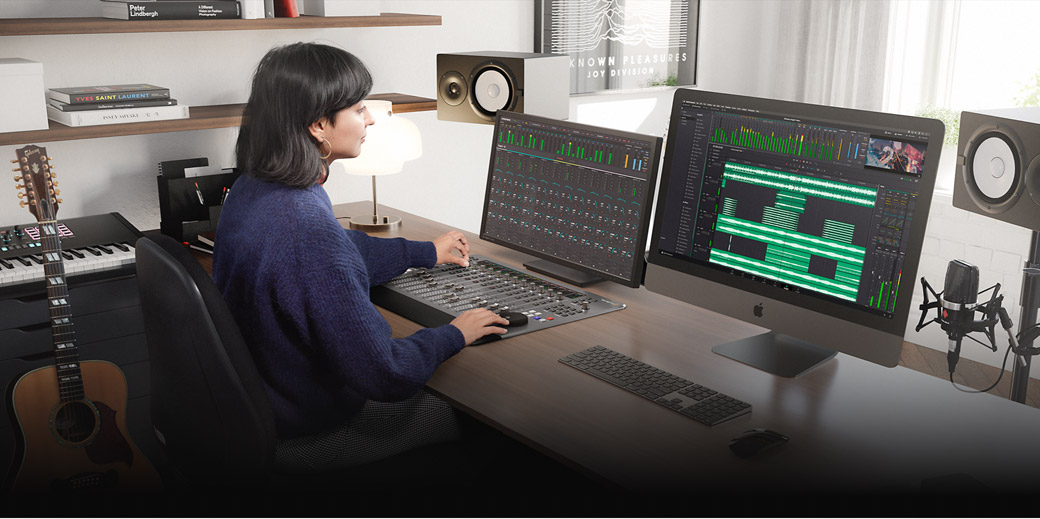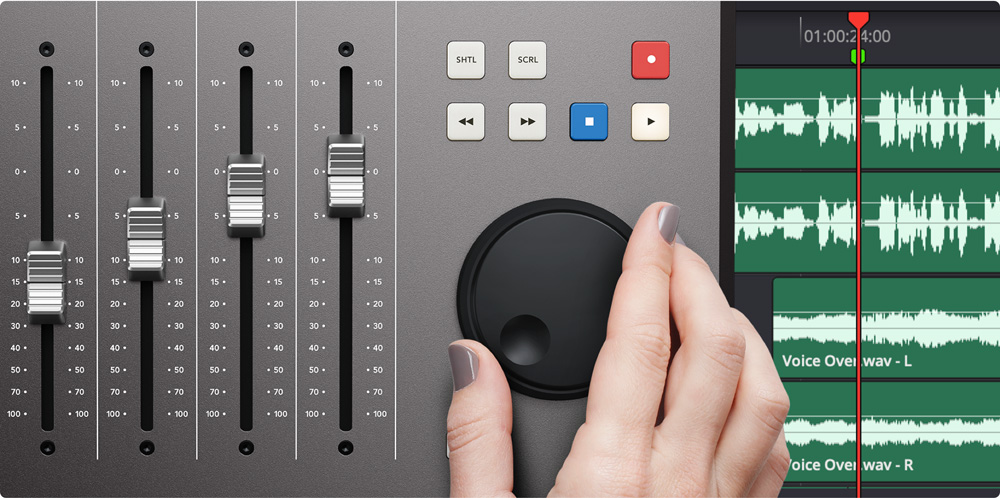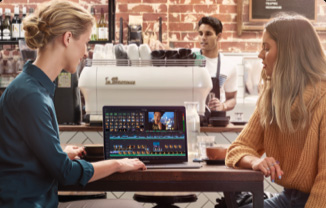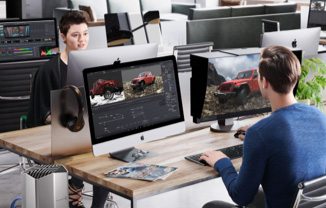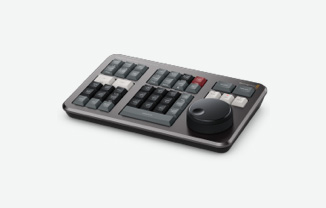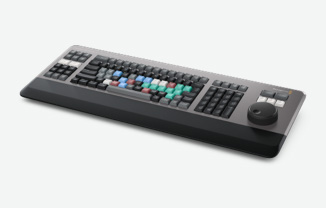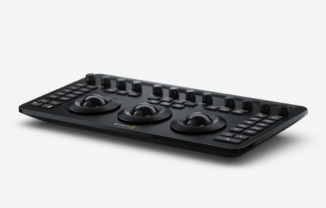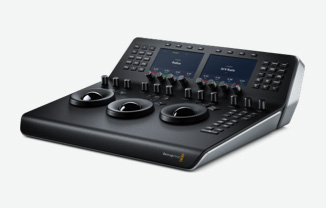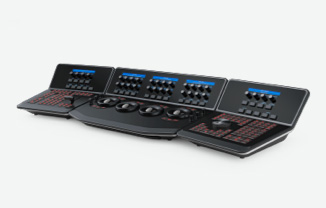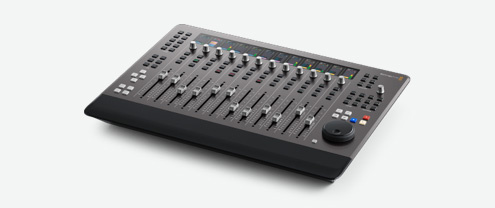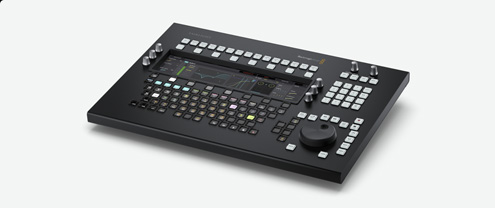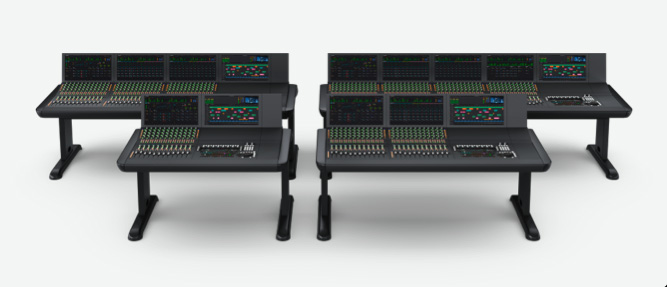Professional Audio Mixing and Editing Consoles
Although the Fairlight page includes a software based mixer that you can use with a mouse and keyboard, using it with a hardware console lets you work much faster! That’s because you can mix multiple sounds and adjust multiple parameters at the same time. The knobs and faders feature the perfect amount of resistance for making extremely subtle adjustments. Fairlight panels have been designed in collaboration with some of the world’s leading audio engineers so you get a streamlined workflow with logically placed controls that automatically adapt to the current task. Whether you’re using a desktop or a modular console, Fairlight lets you work faster and at a higher quality than any other system!
Desktop or Studio Console Models!
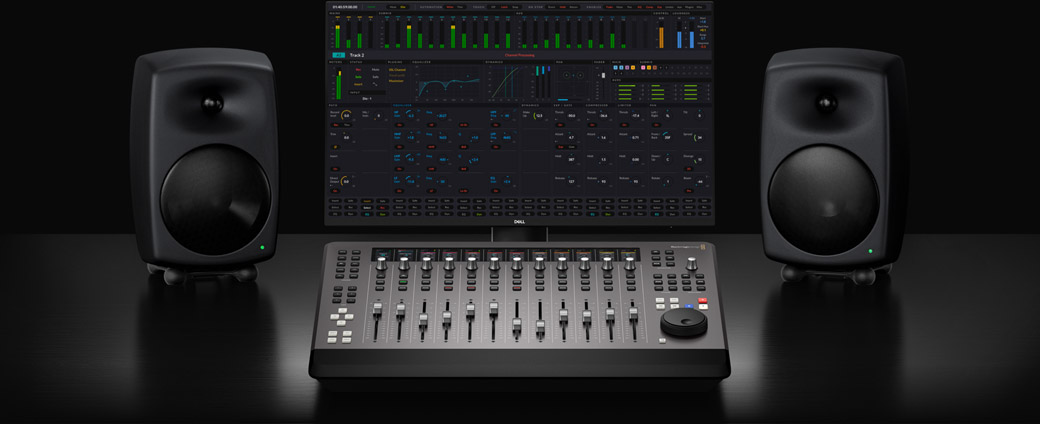
Fairlight Desktop Console
The Fairlight Desktop Console is a full audio control surface featuring a bank of 12 touch sensitive faders and pan knobs, built in LCDs above each channel strip, channel control buttons, automation transport and navigation controls, HDMI graphical interface output for connecting a monitor, and more.
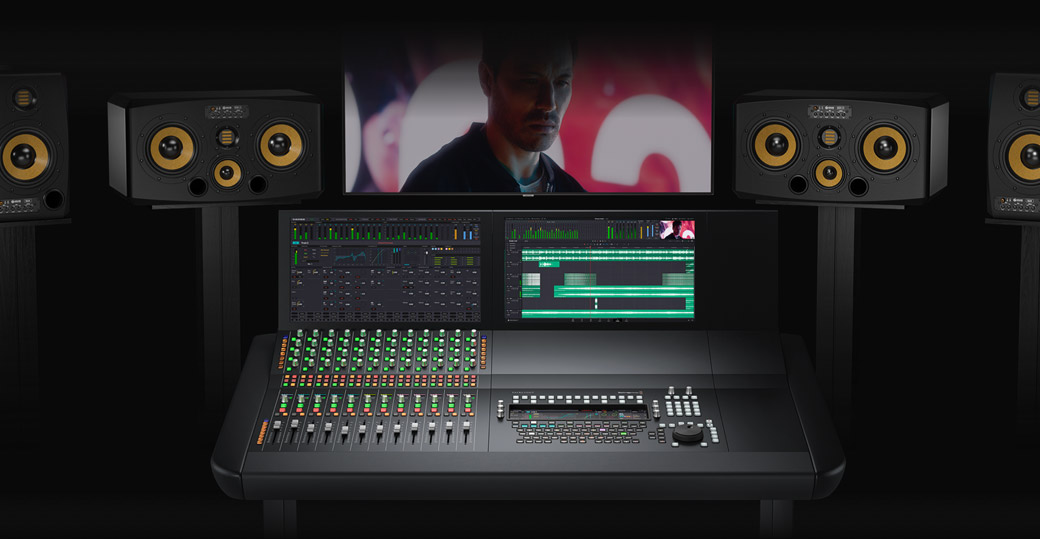
Fairlight Studio Consoles
If you work on film, television, streaming content or commercials, the modular consoles make it easier and faster to mix larger projects with more channels and higher track counts. Modular components can be dropped into existing desks or you can purchase and customize a 2, 3, 4, or 5 bay chassis!
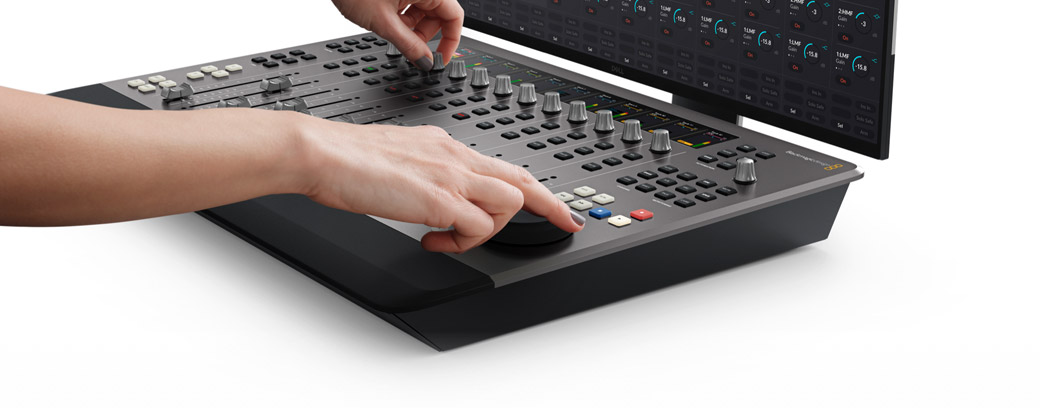
Fairlight Desktop Console
The Fairlight Desktop Console is a complete audio mixing control surface for mixing multiple tracks at once, automating a variety of parameters and plug‑in settings, controlling channel functions, recording, monitoring, and navigating your project. It’s ideal for new users, smaller studios, commercials, online and independent work. You get a familiar mixer design with 12 motorized faders, precision control knobs and illuminated buttons for quickly identifying channels! You can use the knobs and buttons to control channel parameters, EQ, dynamics, plug-ins and more. The built in HDMI output lets you connect a display, giving you the same interactive graphical feedback as the larger consoles!
Compact and Professional
The Fairlight Desktop Console uses the same high quality faders as the full size modular consoles. The sculpted faders are smooth and provide the perfect amount of resistance for making subtle adjustments. The precision engineered encoder knobs ensure a long life of noiseless operation, and the console buttons are rated at a million presses. Individual LCDs display track information for each channel. The high quality search dial is extremely responsive and is much faster than a mouse. The soft front panel bumper makes long sessions more comfortable, the console can be installed flush in a custom desk, and there’s even a built in power supply, which means no power brick!
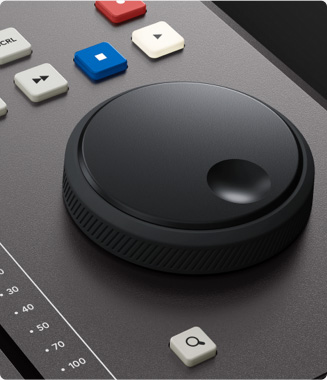
High quality search dial.
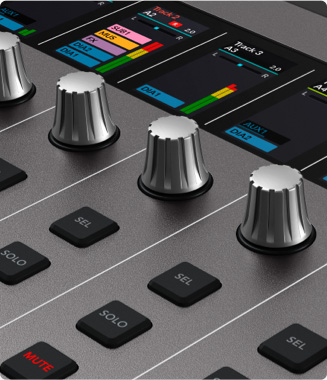
Touch sensitive encoder knobs.
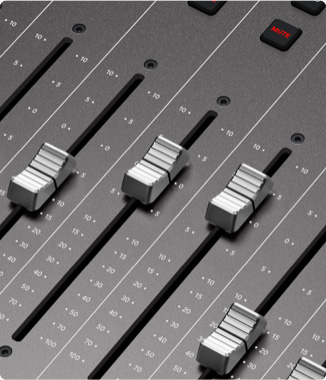
12 motorized faders.
Channel Strips
The Fairlight Desktop Console features 12 channel strips that can be used in a variety of ways for mixing audio. Each channel strip has a motorized fader for adjusting levels, a series of buttons for solo, mute and other parameters, a multifunction pan knob, and an LCD that shows you information about the channel or track on which you are working. Channel strips can be used to control an individual track and any strip can be assigned to any track in the project. You can also use a single strip to control multiple tracks in a group, or you can use the channel strips to control buses. This gives you the speed and flexibility you need for total control over your recording and mixing sessions!
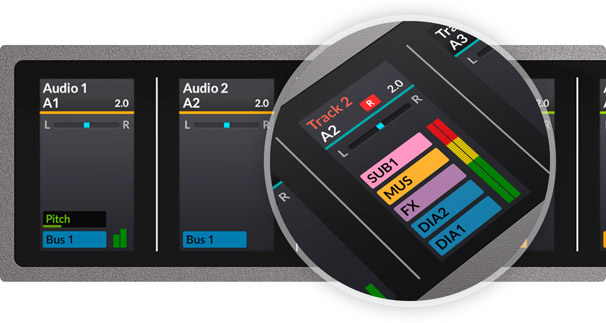
Channel Status Displays
There are independent high resolution LCD screens located above each of the 12 fader strips. These displays include track name, number, and color, along with panning status, channel level meters, automation state, bus routing and more.
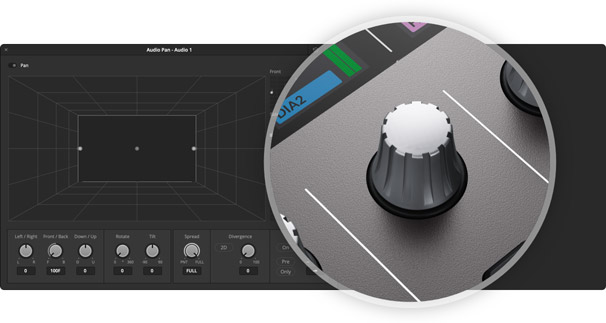
Multifunction Pan Knob
The multifunction pan knob can be used for panning or assigned to control other Fairlight parameters. Hold control and tap to reset, or hold shift for refined control. As it’s a rotary encoder it won’t introduce signal noise like mechanical knobs.
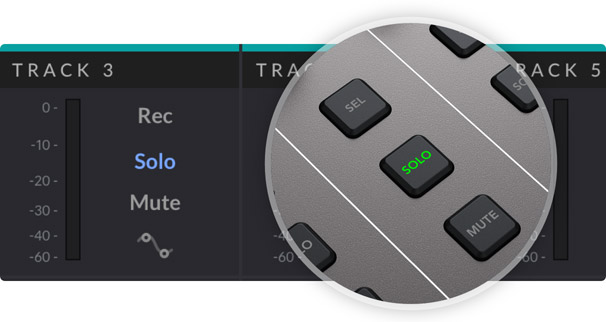
Channel Strip Controls
Each of the 12 fader channel strips has its own dedicated solo and mute buttons for quickly isolating or temporarily turning tracks off. Multi function select buttons can be used to load track parameters, and activate automation and plug‑in controls.
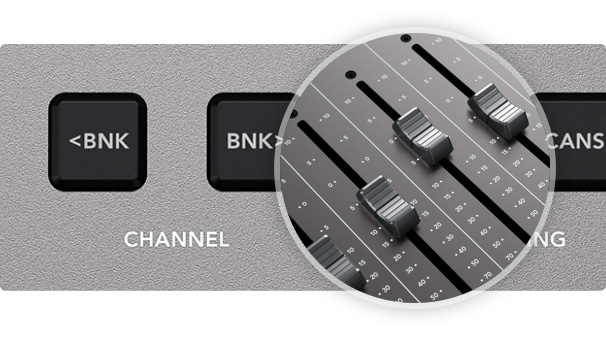
Motorized Faders
Twelve belt driven 100mm motorized faders offer precision volume control for adjusting levels. The bank control buttons let you switch between fader sets to control different channels. Faders can even be assigned to adjust send and record levels.
Task Based Controls
Control function selector buttons let you assign the buttons and knobs on the panel for different purposes. You can quickly select between master and channel controls, panning, plug‑in control, EQ, dynamics and more. By default, the console works in strip mode, giving you one channel strip per track. Focus mode lets you assign all of the select buttons and knobs on the console to work on the parameters or plug-ins for a single track. That means you can adjust the EQ, dynamics or any other plug-in parameter for a track using all of the select buttons and knobs on the console. For example, you can adjust multiple frequency ranges in the EQ at the same time, which is impossible to do with a mouse!

Recording Automation
Fairlight’s powerful automation lets you record parameter changes you make over time. For example, you can record level changes as you move the faders on the console. Fader adjustments are saved and can be edited later. Fairlight lets you automate anything from simple level changes to complex plug‑in, EQ and dynamics changes. That means you can use the console to create and save live adjustments. The faders and knobs are touch sensitive, activating the moment you touch them, so you don’t have to move them for the console to know you want to work on that parameter. Six automation buttons enable and disable automation, set recording method, and which automation curves show in the timeline tracks.

Monitoring Controls
The Fairlight page has incredibly flexible monitoring so you can preview your sound from a variety of different speaker sets. You can listen and switch between everything from headphones, near field or main stereo monitors, all the way up to immersive 3D surround systems. The monitoring controls on the Fairlight Desktop Console let you quickly switch between sources, control both your studio and booth levels, or even control talkback if you have a Fairlight Audio Interface installed with your computer! You also get a level knob along with buttons for dimming and muting your speakers, allowing you to instantly cut or reduce the sound so you can have a conversation in your studio or suite.
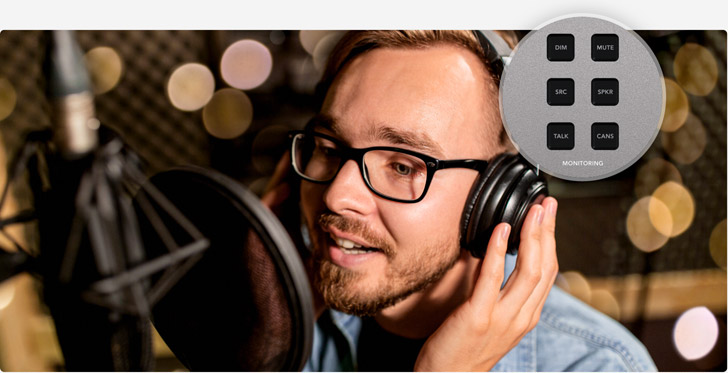
External HDMI Monitoring
For direct visual feedback you can add an HDMI display to the Fairlight Desktop Console. This allows you to see an extensive graphical display of everything happening on the console. You’ll be able to see channel strip information, levels, equalization, dynamics processing, plug-in interfaces and more. That means you don’t have to open pop-up windows on top of your timeline. For example, when you adjust EQ settings, its interface will be displayed on the screen as you turn the knob. The screen automatically switches to show you buses, inline channel strip controls or single channel controls when in focus mode. There’s no configuration needed, simply plug in an HDMI monitor and start working!
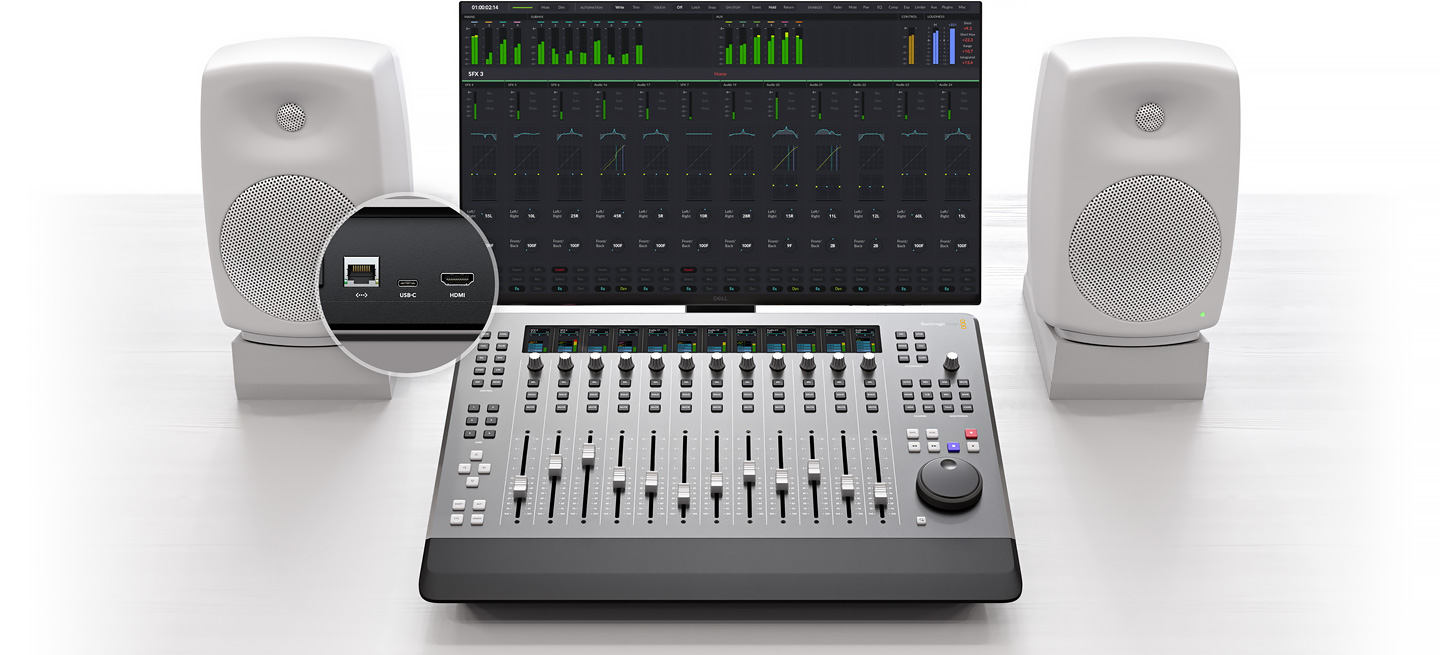
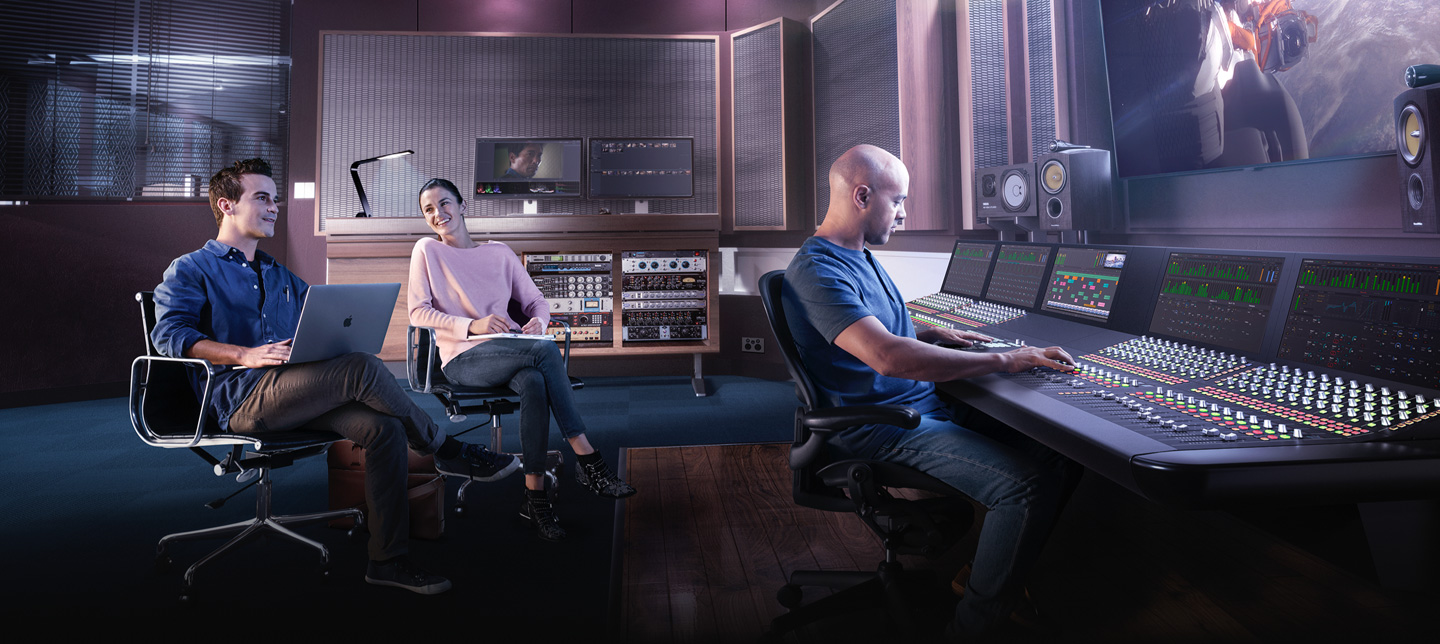
Fairlight Studio Consoles
Once you’ve mastered the desktop console, it’s easy to step up to a larger modular console as most of the controls and interfaces are the same! Modular consoles make it easier to mix larger projects because you have more faders and control buttons. You can create a custom console by combining the Fairlight audio editor, channel faders, channel controls, and LCD monitors. The components can be dropped into your own desk, or you can select and configure a 2, 3, 4, or 5 bay Fairlight chassis. You can buy a chassis today and add to it later as your needs change. There are also chassis accessories that allow you to angle the console, fill in blank panel spaces that you can add to later and more.
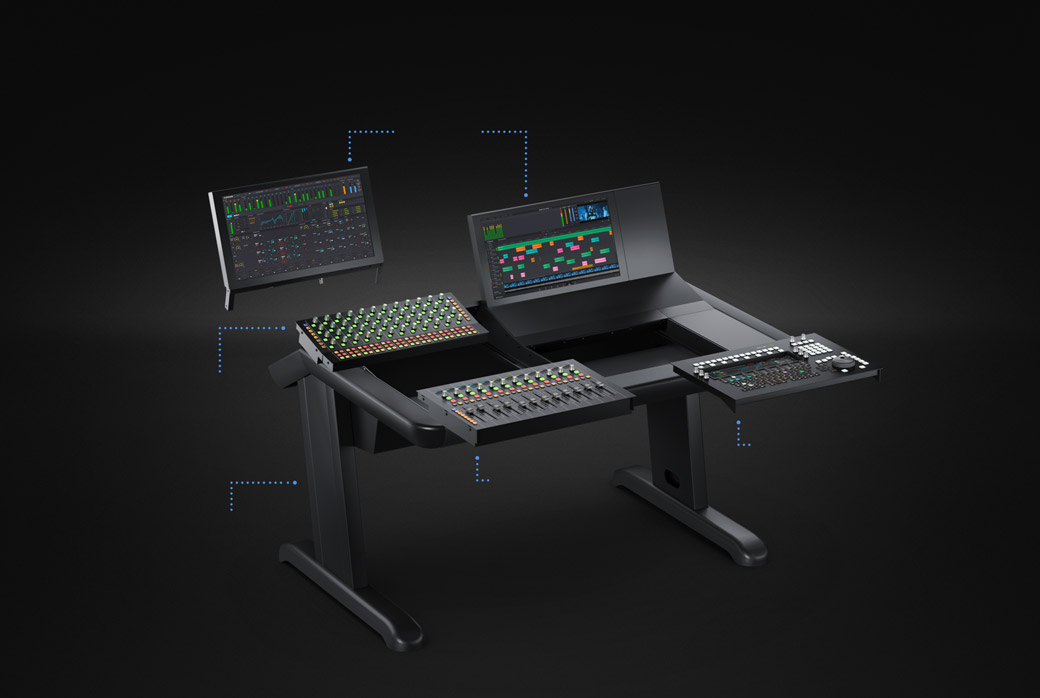
LCD Monitor
High resolution screen with HDMI, SDI and ethernet inputs.
Channel Control
Dual function control knobs and buttons for each channel strip.
Channel Fader
Motorized fader panel with 12 channel strips and controls buttons.
Audio Editor
Hardware control panel for high speed audio editing.
Chassis Bay
Modular cast steel chassis available in 2, 3, 4 and 5 bay configurations.
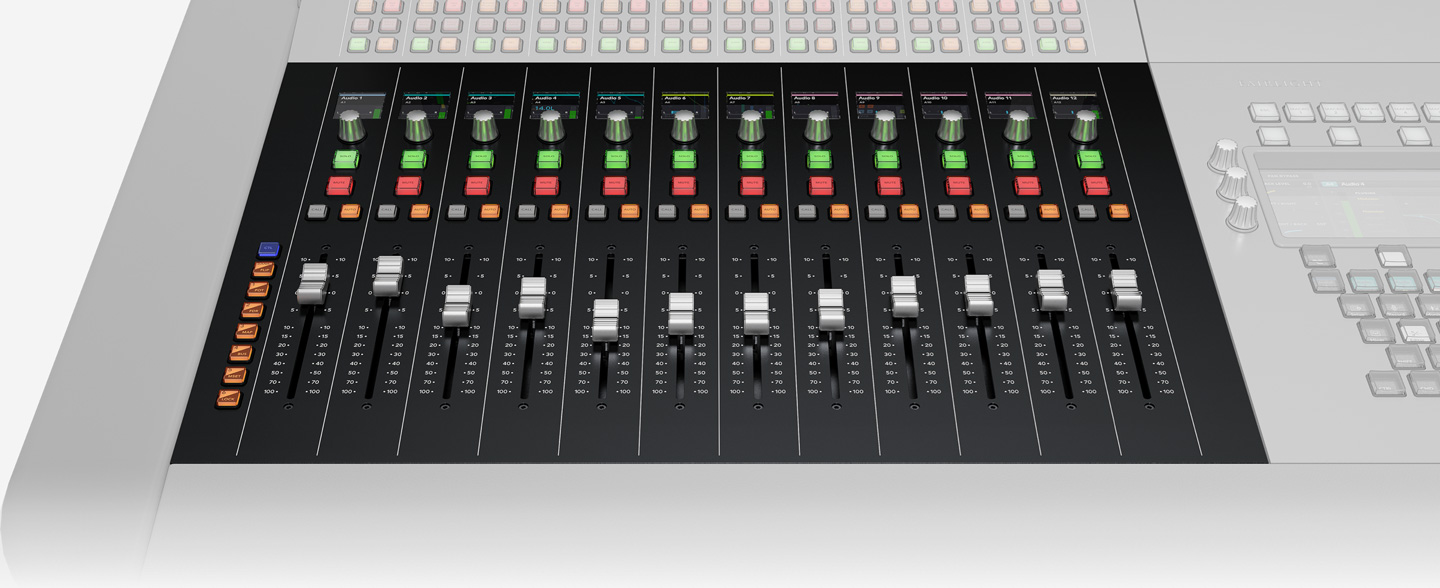
Fairlight Console Channel Faders
Each bank of Fairlight Console Channel Faders features a familiar mixer design with 12 motorized faders per module, rotary control knobs and illuminated buttons. The sculpted, high quality faders are extremely smooth to move and provide the perfect amount of resistance, allowing you to make subtle adjustments. Fairlight Console Channel Fader controls include pan, solo, mute, and call buttons. Each channel strip has an integrated LCD above the channel to display the most important channel information. Fader modules can control up to 144 channels at a time using bank select buttons and you can install multiple fader modules in a 5 bay console. That gives you direct access to more than 500 channels!
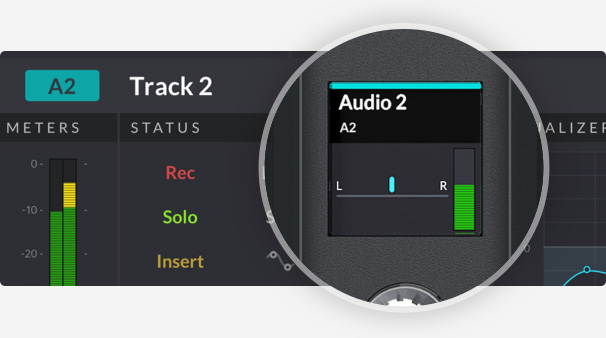
Channel Status Displays
The integrated high resolution LCD screens located above each fader strip let you see track color, name and number, along with pan status, level meters and more. This information correlates directly with the track headers and mixer in the software.
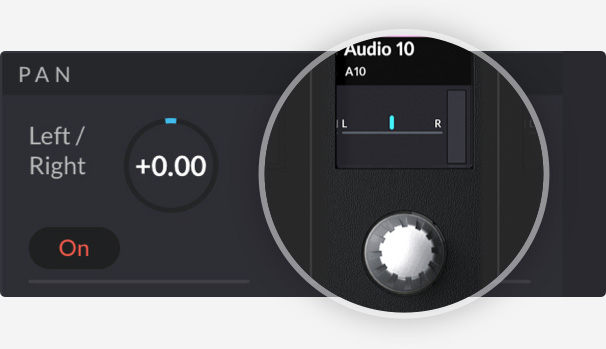
Multifunction Pan Knob
The multifunction pan knob features control tap to reset functionality and can be used for panning or assigned to control other parameters. The pan knob is rotary encoder based, which means it won’t introduce unwanted noise like mechanical knobs.
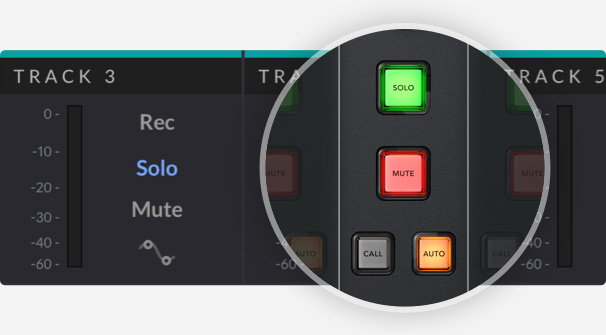
Channel Strip Controls
Each channel strip has dedicated solo and mute buttons to quickly isolate or temporarily turn tracks off. Call buttons can be used to load track parameters, set up fader banks, and spill bus tracks to adjoining faders. Auto buttons enable automation.
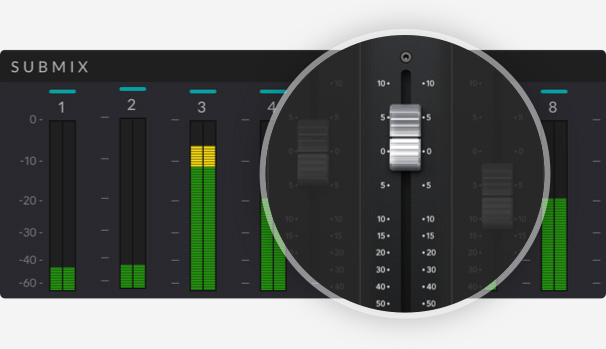
Motorized Faders
Twelve belt driven 100mm motorized faders offer precision volume control. Bank control buttons switch and control 12 banks of 12 faders plus an additional 12 banks of user defined channels. Assigned faders can also adjust send and record levels.
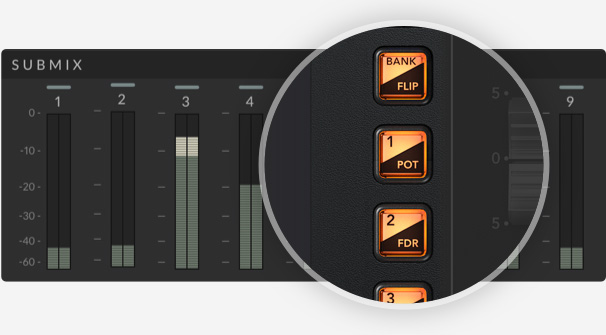
Bank Control Buttons
The six bank and control buttons on the left side of the panel let you quickly switch your faders to work on 12 different sets of sequentially mapped channels. You can also manually map an additional 12 banks of channel faders for each fader panel.
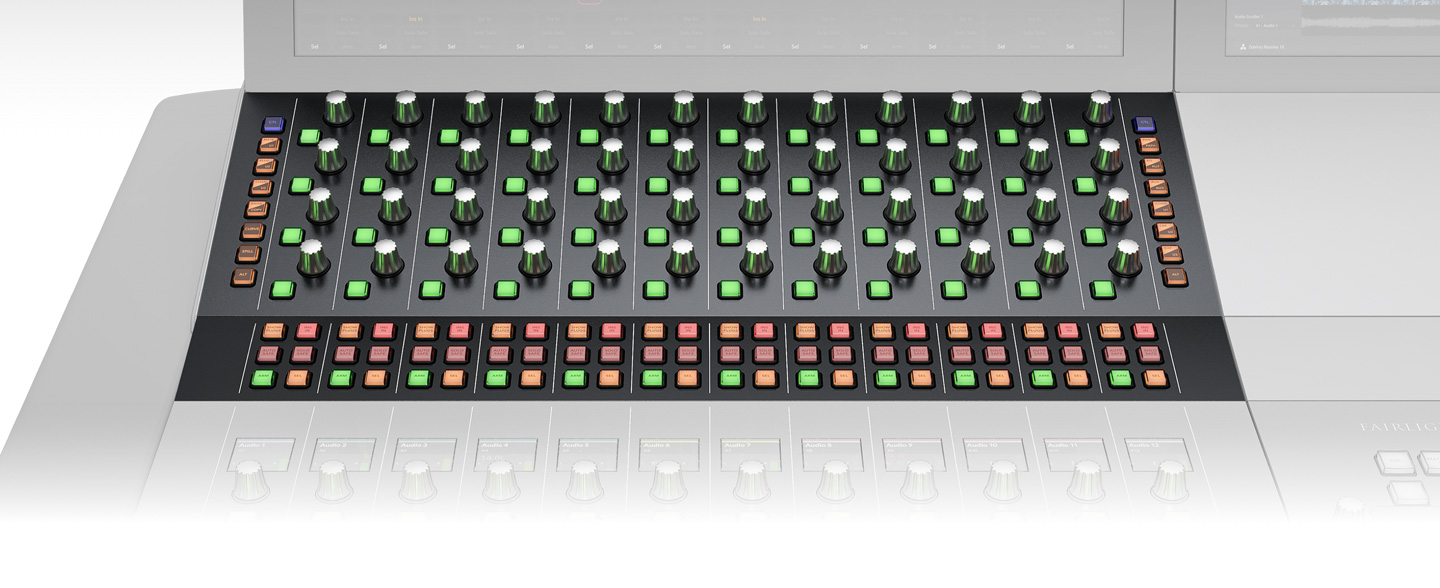
Fairlight Console Channel Control
The channel control module features 12 groups of touch sensitive rotary encoder knobs and illuminated buttons, each of which can be assigned to a single channel, the 12 adjacent fader channels or the master bus. When used in single channel mode, you get instant access to over 192 different parameters for the current selection. That means you don't have to take your hands off the panel or use the mouse to adjust EQ, dynamics and other settings! The LCD above provides visual feedback as you make adjustments. Channel display buttons on the sides let you select the channel display mode, while buttons at the bottom let you set insert in, solo safe, select, and arm for the active channel.
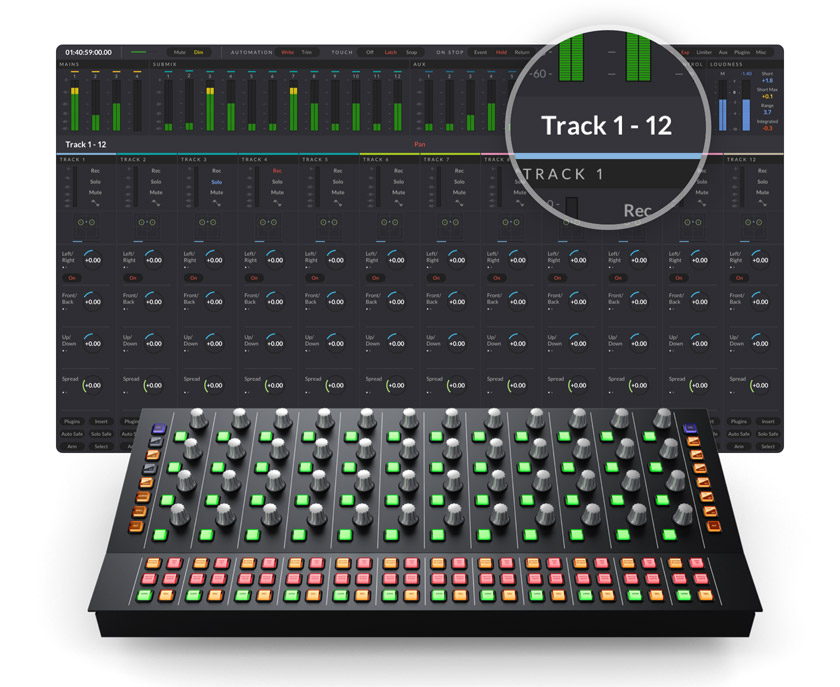
In-Line Channel Control Mode
Splits the knobs and buttons into 12 groups that line up vertically with the 12 faders below. This mode is perfect during live recording sessions because it allows you to easily see and control parameters of multiple microphone inputs simultaneously.
12
independent
control groups
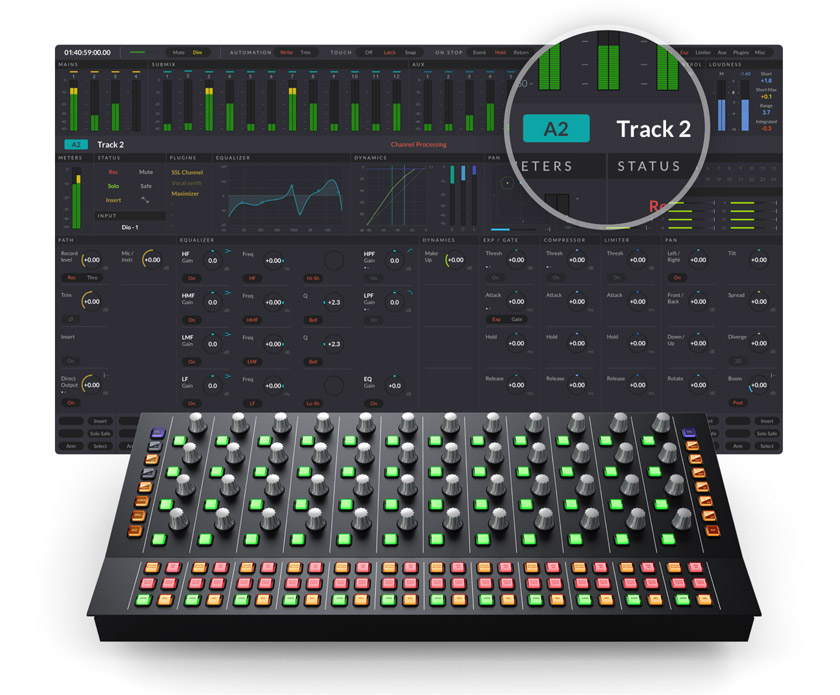
Single Channel Control Mode
Assigns all 12 groups of controls to a single channel, giving you instant access to 192 parameters for the selected track. This is the most common mode used in audio post production, as it provides quick access to all controls for a specific track.
192
unique
parameter controls
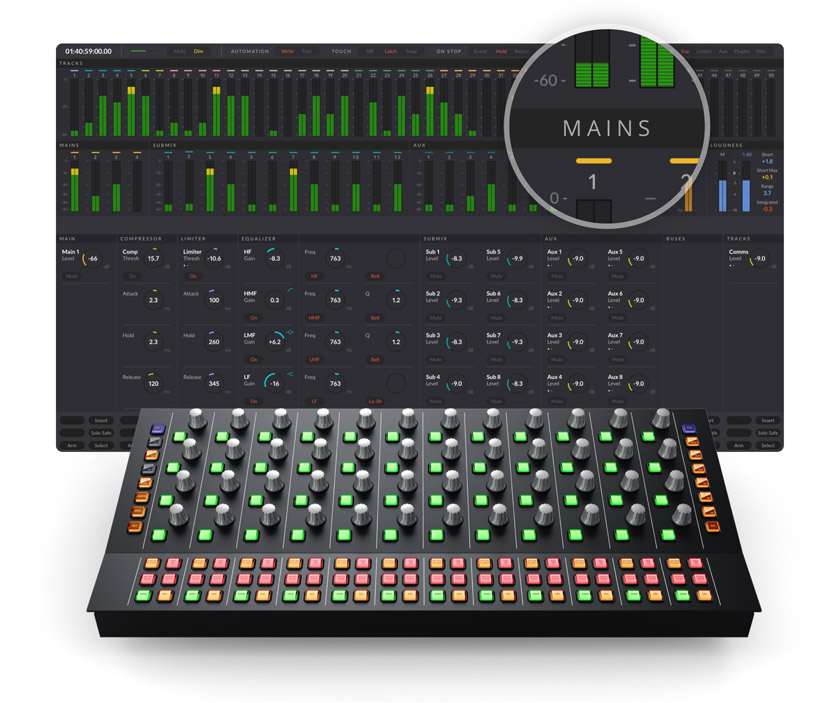
Master Channel Control Mode
Master channel control mode utilizes all channel controls to adjust parameters for the master buses. The controls in master mode are organized from left to right in order of processing. Master mode is commonly used for mixing and mastering soundtracks.
68
master bus
control parameters
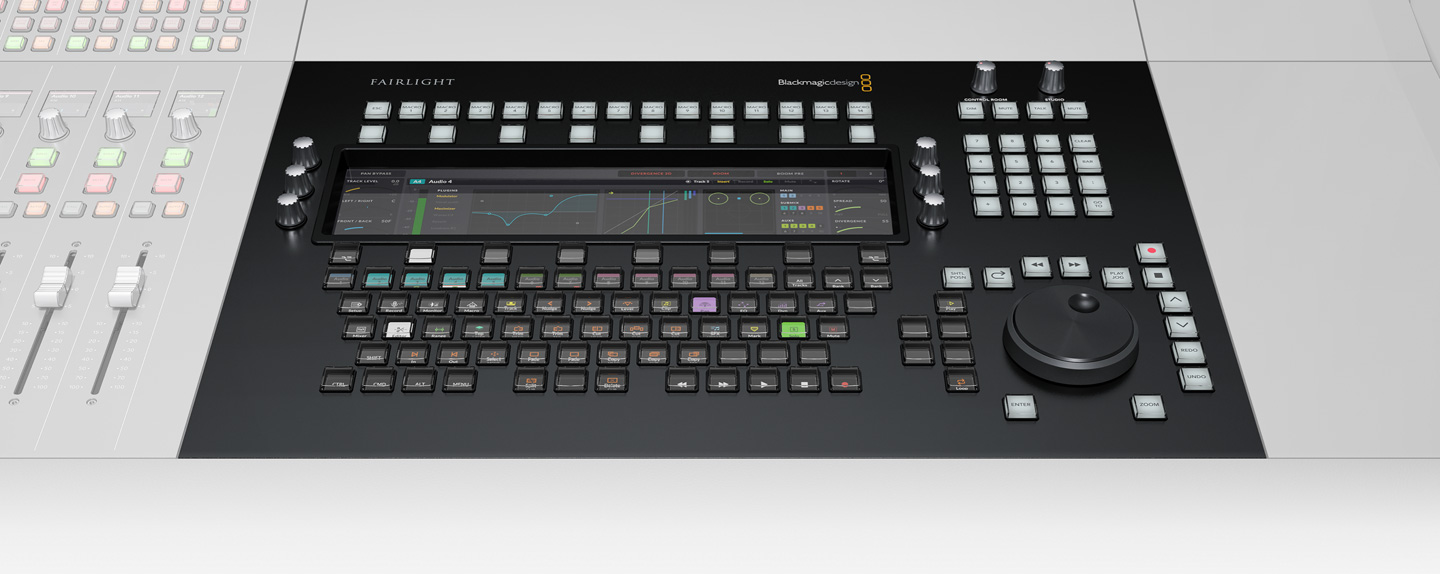
Fairlight Console Audio Editor
The Fairlight Console Audio Editor lets you use both hands with the search dial and action keys to work quickly without ever taking your hands off the panel. It gives you quick access to virtually every feature in the software and features a graphical custom function keyboard. The keys automatically change based on the current task, putting the controls you need right under your fingertips when you need them so you can work faster! There’s also a built in 12" LCD screen that displays information based on the current task, macro keys for automating repetitive tasks, transport controls and more. The Fairlight Console Audio Editor can also be purchased and used as a stand alone desktop model.
Integrated LCD
The Fairlight Audio Editor features a large 12" high resolution LCD with soft buttons and knobs. It’s an interactive audio editing dashboard with 5 different layouts, giving you a full graphical interface for EQ, dynamics, plug-ins and other tasks. The screen automatically changes to show you the information, tools and controls you need for the current activity. This lets you work quickly because you don’t have to grab the mouse, look up at the computer display and stop what you’re doing! For example, when adjusting EQ, you’ll see the parametric equalizer curve on the display. You can use the knobs to adjust the gain in different frequency ranges and see instant feedback as the curve changes.

EQ Layout
Clip EQ layout gives you total control over the 4-band parametric equalizer parameters for the selected clip. This gives you all the same EQ controls that are available in the inspector in DaVinci Resolve, along with clip EQ preset options.

Standard Mixing
Standard mixing layout displays information for the currently selected track. This includes level, pan, meters, the 6-band parametric track EQ, dynamics and more. The soft buttons and knobs give you quick access to common controls.

Plug-Ins
Displays controls for the first plug-in on the selected track. This screen has a 3 page layout giving you access to plug-in bypass and reset, loading and saving of presets, and for mapping plug-in parameters to any of the six rotary knobs.

Aux Sends
When viewing the aux layout, you’ll see all of the send levels and panning for up to 24 auxiliary channels all at the same time. The soft buttons along the top of the screen let you enable different aux channels for the active tracks.

Monitor Mode
The monitoring mode layout provides visual feedback for the dim and fixed levels, along with control room, loudness and studio meters. It also displays a graphical representation of the speaker configuration for your listening environment.
More Great Fairlight Audio Editor Features!
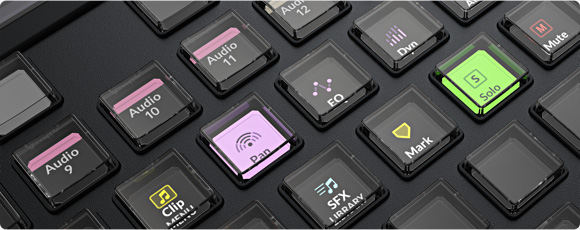
Custom Function Keyboard
The custom keyboard features easy to read, multi-function self labeling keys with dedicated layouts that cover nearly every function of the Fairlight page. The images on the keys change based on the task you’re performing so you can work quickly!
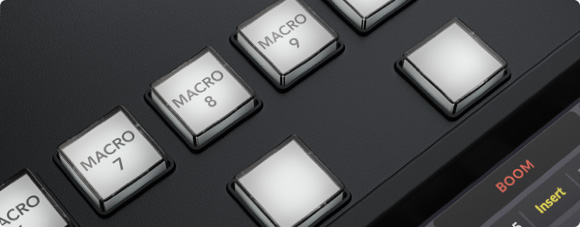
Programmable Macro Keys
Macro keys can be used to record sequences of keystrokes that you can re-call and use at any time to automate repetitive tasks and speed up your workflow. There are 14 dedicated macro keys along with a mode for displaying thirty macros on the keyboard.
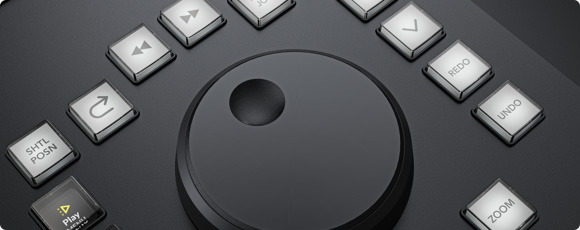
Transport Controls
Navigation keys and the search dial let you quickly move around the timeline, record, search, playback at variable speeds, set locators to jump to a new position and more. They can also be used to zoom, adjust levels, shape fades and trim edits.
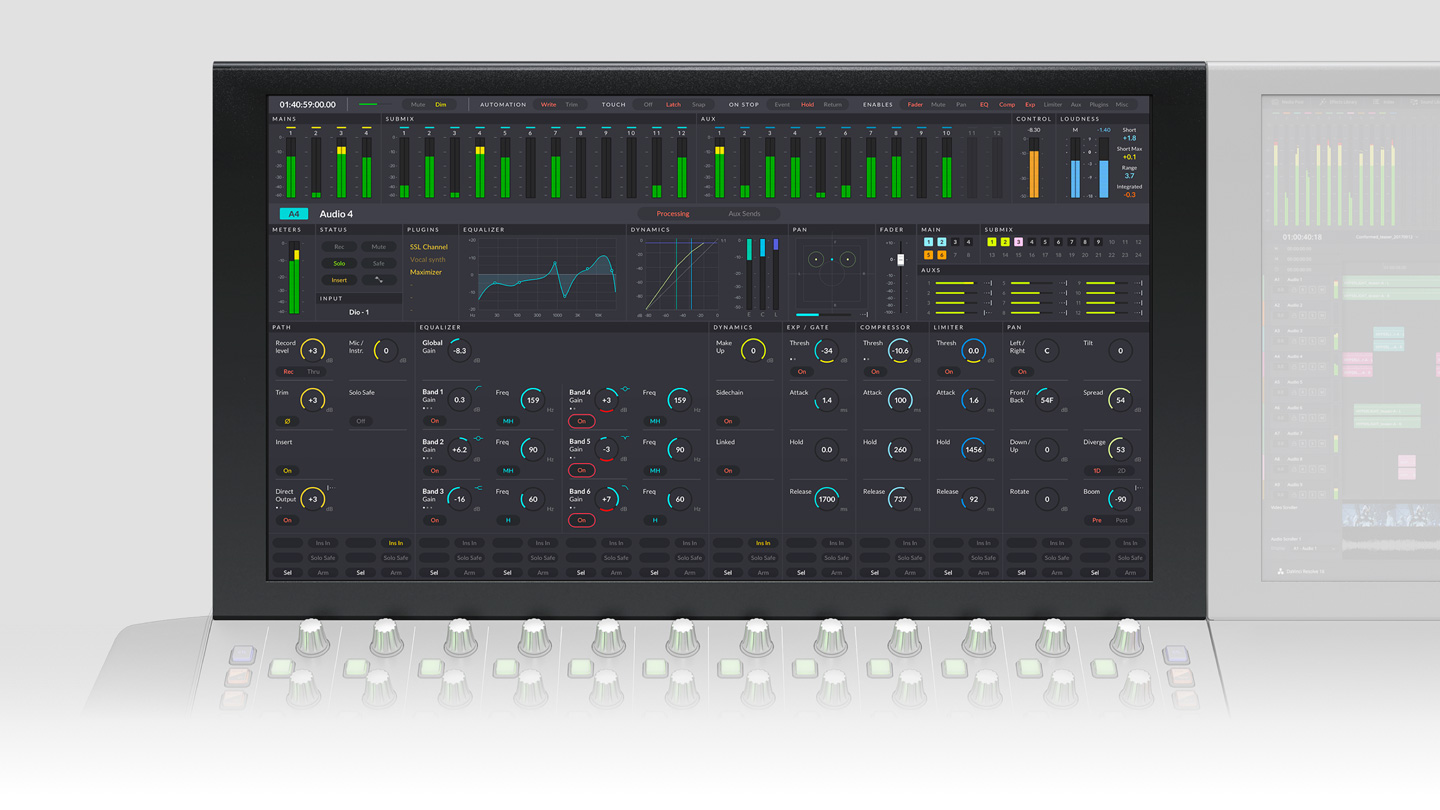
Fairlight Console LCD Monitor
You can add a high resolution computer and display to every bay! Each LCD is its own self contained computer running Blackmagic OS giving you instant graphic feedback for all channels in that module. The LCD features ethernet, HDMI and SDI inputs. It can display channel information, the DaVinci Resolve user interface, plug‑in interfaces, or video previews. Depending on the task, you’ll see individual channel information inline with each fader strip below, all parameters when used in single channel mode, or all controls for master mode. Previewing the video program while mixing and editing allows you to see the talent up close. You get a detailed view of character faces for checking lip sync!
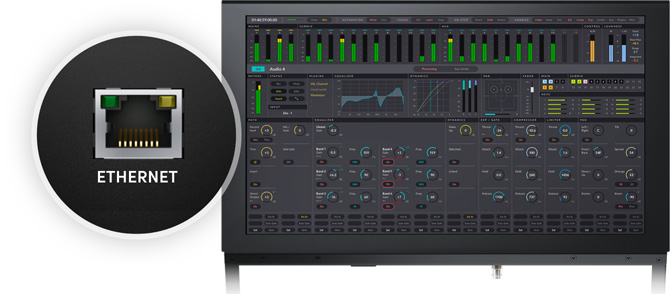
Graphical Channel Control Feedback
When installed above a channel control panel, the LCD is connected via Ethernet. The LCD includes a built in computer running Blackmagic OS to generate realtime graphical feedback for the controls on the panel below based on the channel control mode.
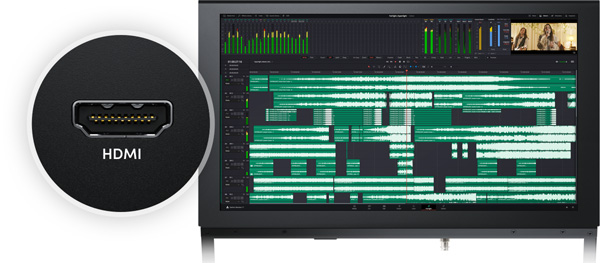
DaVinci Resolve User Interface
When the LCD is installed in a console above the Fairlight Audio Editor, the HDMI connection is used to connect the computer to the LCD. This allows the console operator to see the DaVinci Resolve interface without needing a separate monitor on a desk.
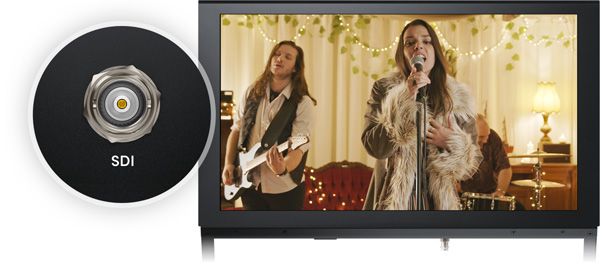
Full Screen Video Preview Monitor
The console LCD monitor also features an SDI connection that can be used to take the video preview from DaVinci Resolve via a DeckLink or UltraStudio interface. This lets you see a full screen preview of the program and is perfect for checking lip sync.
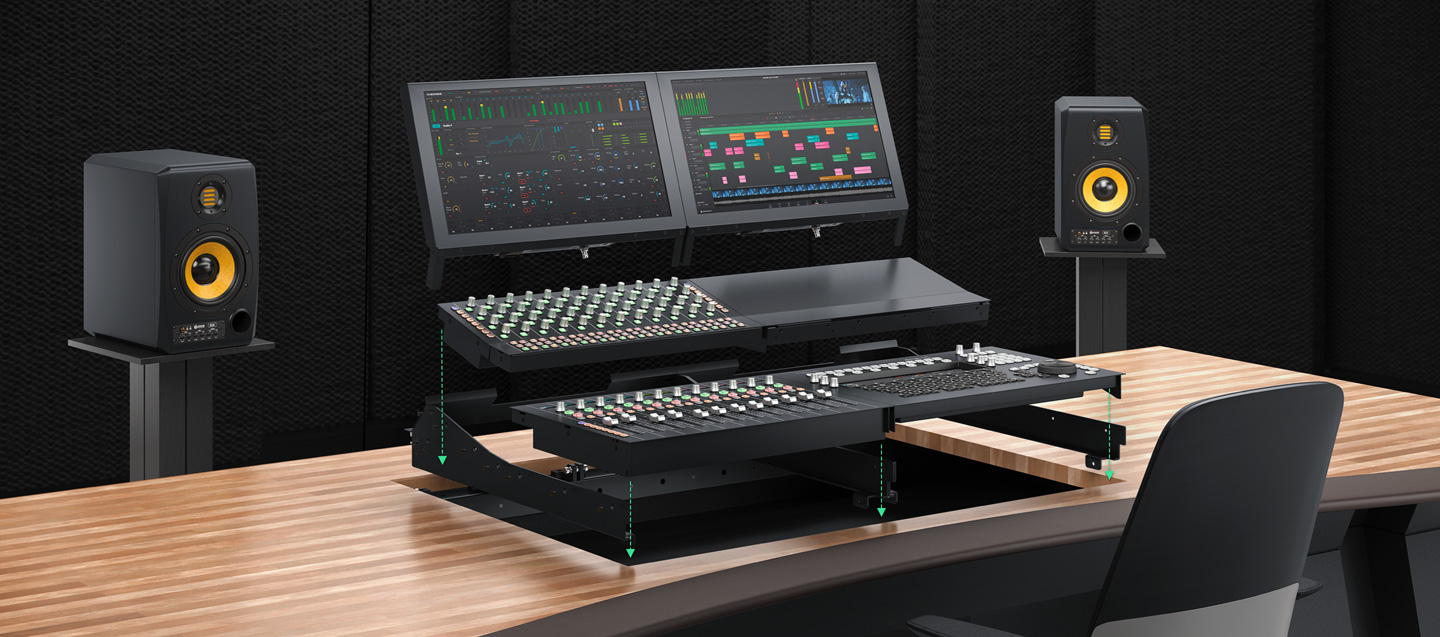
Customize Your Own Console
Fairlight’s modular components are designed to be flexible so you can use them with your own furniture or in a Fairlight chassis. They can be dropped into your own desks, making it easy to upgrade existing suites and furniture with Fairlight hardware. Each component comes with a mechanical drawing and cut out pattern that can be used as a guide, making it easy to modify your furniture to accommodate Fairlight hardware. Brackets and frames are also available for securely mounting the modules in place, ensuring a perfect, professional fit. The optional Fairlight HDMI Monitor Interface lets you connect your own display, providing similar functionality as the Fairlight Console LCD Monitor. Find a Reseller
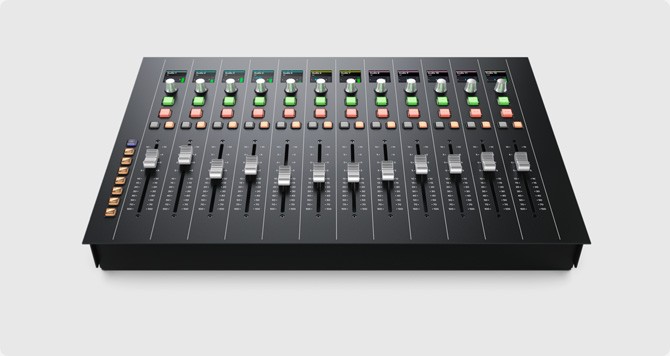
Fairlight Console Channel Fader
Add a fader module with 12 motorized faders, rotary control knobs and illuminated buttons for pan, solo, mute and call.
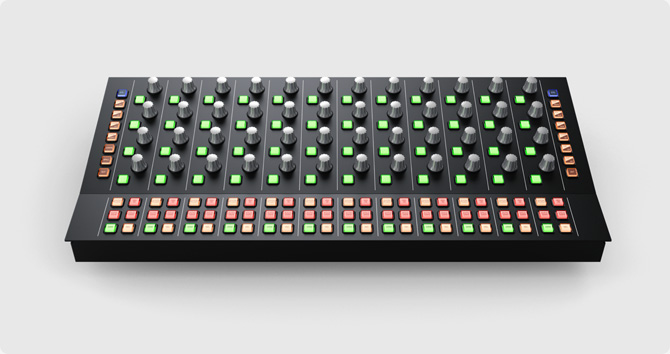
Fairlight Console Channel Control
Features 12 groups of touch sensitive knobs and buttons assignable to a single channel, a fader strip or the master bus.
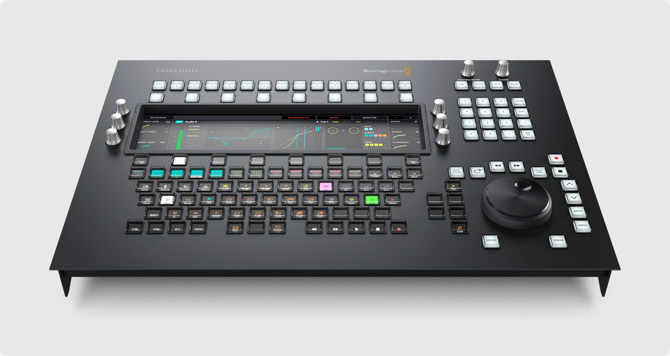
Fairlight Console Audio Editor
Get quick access to Fairlight features with a 12” LCD screen and keys that automatically change based on the current task.
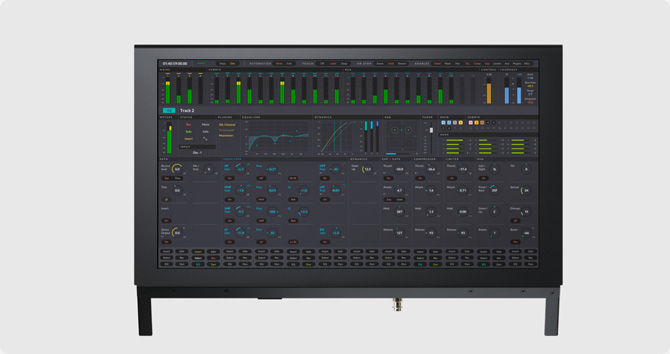
Fairlight Console LCD Monitor
High resolution LCD running Blackmagic OS designed to give you instant graphic feedback for all channels in a module.
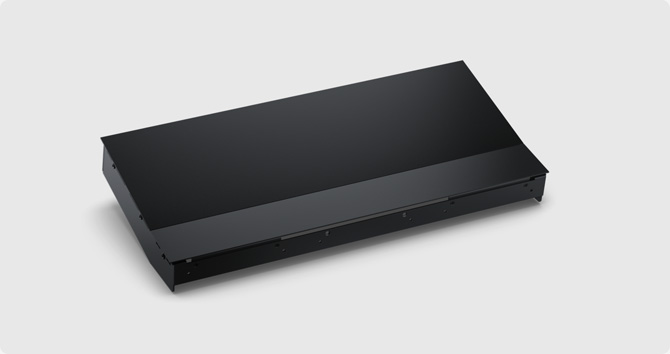
Fairlight Console Channel Control Blank
Blank insert panel designed to match the Fairlight console chassis and fill an empty slot.
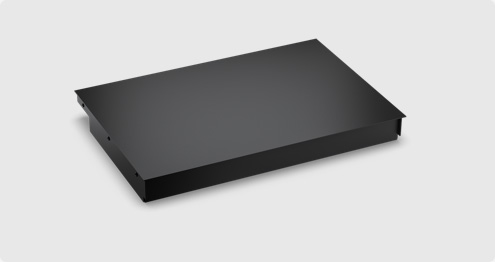
Fairlight Console Channel Fader Blank
Machined metal blank insert panel designed to fill an empty fader control slot in your console.
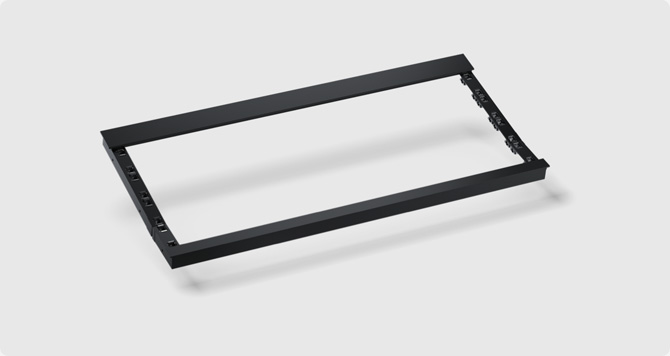
Fairlight Console Channel Rack Kit
Add a standard 3 rack unit, 19 inch rack mount into a custom desk to provide a frame for the Fairlight Console Channel Fader module.
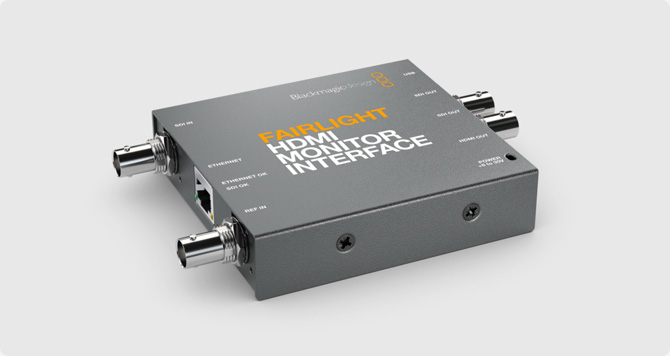
Fairlight HDMI Monitor Interface
Use your own HDMI or SDI monitors with a Fairlight Console Channel Control to get instant graphic feedback for all channels.
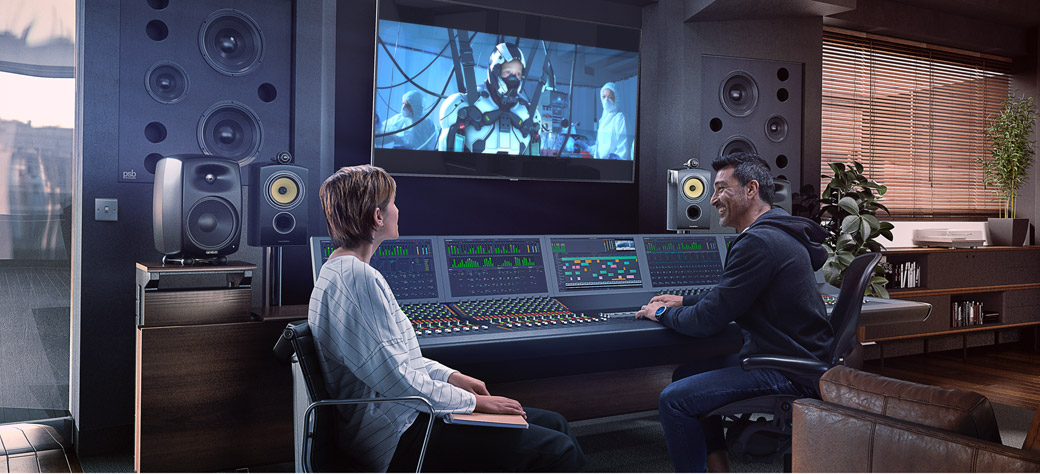
Buy Fully Assembled Consoles
Fairlight’s modular components can also be purchased and configured with a 2, 3, 4 or 5 bay Fairlight chassis to meet your needs. Consoles can be configured with channel fader panels, channel control panels, a Fairlight Audio Editor and LCD monitors. The 2 bay chassis is about the size of a desk, ideal for small studio spaces. The 3 and 4 bay consoles allow for higher track counts and are designed for medium size audio suites. The 5 bay console is perfect for high end suites and mixing stages that require massive track counts. Your reseller can help you to spec out the panels you need, up to 7 fader modules in a custom unit. You can build it yourself or have a reseller assemble it for you. Find a Reseller

DaVinci Resolve
Software
DaVinci Resolve 20
Free
DaVinci Resolve Studio 20
£225
Editor Keyboards
Color Panels
Fairlight Audio Consoles
Fairlight Studio Console Bundles
Fairlight Console Bundle 2 Bay
£16,755
Fairlight Console Bundle 3 Bay
£22,845
Fairlight Console Bundle 4 Bay
£30,475
Fairlight Console Bundle 5 Bay
£37,329
Fairlight Console Chassis Leg Kit 0 Deg
£305
Fairlight Console Chassis Leg Kit 8 Deg
£305
Fairlight Studio Console Individual Modules
Fairlight Console Channel Fader
£3,175
Fairlight Console Channel Control
£1,955
Fairlight Console Audio Editor
£3,535
Fairlight Console LCD Monitor
£1,135
Fairlight Studio Console Unpopulated Chassis
Fairlight Console Chassis 2 Bay
£6,555
Fairlight Console Chassis 3 Bay
£7,319
Fairlight Console Chassis 4 Bay
£8,395
Fairlight Console Chassis 5 Bay
£9,925
Accessories For Custom Furniture
Fairlight HDMI Monitor Interface
£205
Fairlight Console Mounting Bar 2 Bay
£295
Fairlight Console Mounting Bar 3 Bay
£365
Fairlight Console Mounting Bar 4 Bay
£405
Fairlight Console Mounting Bar 5 Bay
£465
Fairlight Console Side Arm Kit
£185
Fairlight Narrow Blank Kit
£385
Fairlight Console Channel Rack Kit
£159
Fairlight Console Channel Control Blank
£145
Fairlight Console LCD Monitor Blank
£335
Fairlight Console Channel Fader Blank
£155
Fairlight Audio Interfaces
Fairlight Audio MADI Upgrade
£155
Fairlight Audio Accelerator
£875
Fairlight Audio Interface
£1,879
